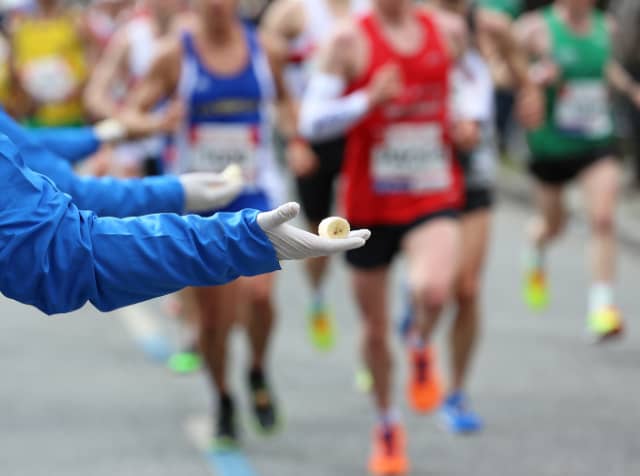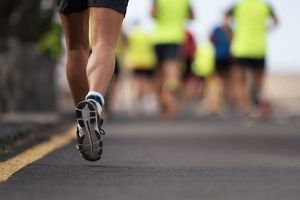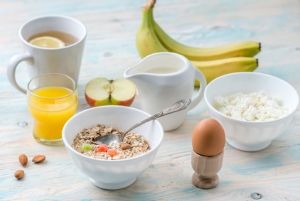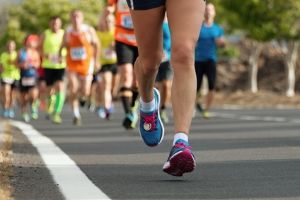The daily diet of a marathon runner
The daily marathon diet is no different from a normal sportsman. Throughout the year, you should strive for a healthy and balanced diet. Of course, if you are prone to a few deviations, you should redouble your efforts the month before the event in order to put all the chances on your side.
On the protein side, endurance athletes have requirements that vary between 1.2 g and 1.6 g of protein per kg of body weight depending on the intensity and duration of the effort (1). For a marathon, we recommend 1.5 kg of protein. In fact, if you weigh 70 kg, you need 105 g of protein all year round (84 g minimum - 112 g maximum). Don't hesitate to vary the sources: white meat, fish, shellfish, chicken, whole eggs. These intakes can be supplemented with vegetable proteins and/or dietary supplements such as whey protein. The rule is simple since you must have a source of protein at every meal.
For carbohydrates the objective is to consume them but without excess. As a marathon runner you should monitor your weight on the scale once a month. Whether cycling or running, every kilogram has an impact on your performance. Wholegrain cereals (oatmeal, muesli), fruit, vegetables, rice, pasta or sweet potato are interesting sources of carbohydrates. They must be present on your plate.
Finally, the lipids are necessary for the functioning of our body. Choose good sources such as olive oil, almonds, cashews, whole eggs, avocados or fatty fish (salmon, mackerel, sardines, herring, tuna). We estimate our fat requirements at 1 g/kg body weight.
At the same time, we strongly advise you to drink a minimum of 1.5 litres of water during the day.
Day D-3: replenish glycogen stocks
If you've banned butter, cookies, pizza and other pastries throughout the year, you're on the right track. Serious things begin 3 days before the event. Continue, of course, to eat healthily but now focus on your carbohydrate reserves.
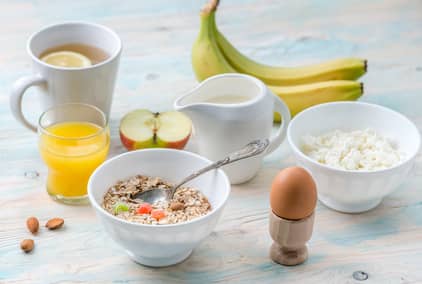
1 green tea + 2 teaspoons of honey
1 vegetable drink
60g oat flakes
2 fruits
1 compote
2 œeggs
600 kcal - 85 g Carbohydrates - 17 g Fat - 30 g Protein
Carbohydrates are the primary source of fuel in endurance events. In order to perform well in a marathon, it is therefore essential to boost your carbohydrate reserves at least 72 hours before the event.
During this period, give preference to foods with a low to moderate glycemic index.
A study (2) has shown that increasing carbohydrates by 60% to 75% over 4 days, without excess calories, increased stocks by 23%. With a carbohydrate-induced caloric surplus, the glycogen stock increases further. In fact, if you usually eat 250 g of carbohydrates/day, you can gradually increase the dose to around 400 g daily over 3 to 4 days.
24 hours before your marathon, rest your muscles and stop training. If carbohydrates are difficult for you, drink them! i-Run, specialized in running, offers maltodextrin. It is the ideal supplement to give you a little boost since it is carbohydrates but in liquid form. Moreover the manufacturer recommends to consume 1.5 l of maltodextrin per day during the 3 days preceding your marathon. Of course, this only applies if you are unable to satisfy your needs through solid food.
Maintain hydration at 1.5 litres or more on training days and/or in hot weather.
D-Day: eating during the marathon
Start of the race at 9:00 a.m. Wake up at 6:00 am for a good breakfast. The objective could be to consider a last carbohydrate rebound to replenish glycogen in the muscles as well as the liver. However, the risk is a rise in insulin levels, lowering blood sugar and therefore performance levels. One study seems to have found a good compromise with the ingestion of 100 g of carbohydrates 3 h before the endurance race (3). Therefore, consume carbohydrates but not in excess.
Of course there should be no room for improvisation so close to the deadline. The breakfast as well as the energy gels and other drinks used on the day should have been tested several times in training beforehand.
For example, the presence of fibre in whole grains can cause gastric or intestinal discomfort in some athletes. In others, it will only be positive for them. It is therefore advisable to personalize your meals according to your own habits.
After breakfast, treat your hydration with a juice, tea, a glass of lemon water or a vegetable drink. Drink small sips until the start of the race.
What to eat/drink during a marathon?
As soon as you warm up, you can add maltodextrin to your drink. At this level, scientific studies are of great help to us. They show that the carbohydrates ingested during an endurance effort begin to be used 30 minutes later, with maximum effectiveness 2 hours after intake. This latency time must be taken into account.
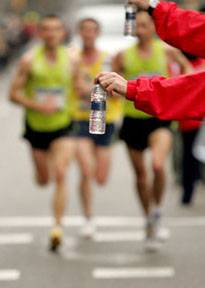 Hydration during exercise is essential and even vital for the proper functioning of the body. Water is used to cool the active body and prevent heat stroke. A loss of water makes the blood thicker, imposing more effort on the heart, a decrease in oxygen supply and a drop in performance. 1% water loss leads to a 10% drop in performance and health risks (tendonitis, kidney stones, etc.). Learn more
Hydration during exercise is essential and even vital for the proper functioning of the body. Water is used to cool the active body and prevent heat stroke. A loss of water makes the blood thicker, imposing more effort on the heart, a decrease in oxygen supply and a drop in performance. 1% water loss leads to a 10% drop in performance and health risks (tendonitis, kidney stones, etc.). Learn more
Furthermore, your drink must contain carbohydrates and be isotonic. See how to make an isotonic drink..
It also shows that the ingestion of carbohydrates such as maltodextrin 3 h before the event combined with intake during the endurance event significantly boosts performance (4). It should therefore be remembered that the maltodextrin-type exercise drink, which can be used in marathons, must be used before the start of the event to take full advantage of it. See our recipe for making your own isotonic drink.
During the race, you lose water but also sodium through your perspiration. Sodium is useful for muscle contraction and must be corrected. Therefore, do not miss any supplies. Remember to stay hydrated but also to eat salty food. You eliminate between 1 and 4 g of sodium per litre of sweat.
To prevent tiredness, you can get some energy gels or bars. One energy gel per hour of effort seems sufficient. Above all, make sure you stay hydrated by drinking small sips of water throughout the course.
Day D+1: after the race
42.195 km have passed and food will allow you to recover more or less quickly. Again, the goal is to build up your glycogen stores.
Immediately after exercise, we advise you to choose carbohydrates with a high glycemic index. Energy drinks that do not contain fibres or fats should be promoted. Easier to digest, recovery will be accelerated. The ideal recovery drink seems to be 80% carbohydrates and 20% protein for endurance athletes.
Indeed, the addition of protein will boost your recovery as well as the action of carbohydrates. This combination accelerates the speed of muscle glycogen synthesis. In addition, proteins promote the repair and strengthening of muscle fibres. According to studies (5), taking carbohydrates + proteins together is therefore the best strategy for energy recovery. Muscle recovery is obtained in 8 hours compared to 22 hours for carbohydrates alone.
Timing matters. We recommend 50 g of carbohydrates within 30 minutes of your marathon and then 1.2 g per kg of body weight per hour for the next 3 hours. Concretely, if you opt for a recovery drink OVERSTIM Elite and that you weigh 60 kg, you consume a 600 ml can after the effort then a 1 litre can at H+1, H+2 and H+3. In one intake, you have the proteins and carbohydrates your body needs to recover well.
Note that after one hour, you can also switch to a solid diet of carbohydrates and proteins. On the other hand, avoid a high-fat meal within 3 hours of your marathon.
Conclusion
A good diet for a marathon may not be enough to win the race, but a poor diet can definitely make you lose it. To have fun, produce a satisfying performance and recover quickly, you should follow a few rules.
Throughout the year, make sure you eat a healthy and balanced diet. For endurance athletes, 1.5 g protein/kg body weight and 1 g fat/kg body weight are recommended.
3 to 4 days before the event, fill up with carbohydrates to boost your stocks. On D-Day, eat a balanced breakfast at least 3 hours before the start, without neglecting your hydration.
At the end of the event, rely on the combination of carbohydrates + proteins to replenish your energy reserves and get back on the training track without getting injured.
Have a good race & Bon appétit
References:
(1) Gundill and Delavier "Guide des compléments alimentaires pour sportifs" 2019
(2) Tarnopolsky M.A, et al. Influence of weight training exercice and modification of hormonal response on skeletal muscle growth. 2001
(3) Schabort E.J., et al. The effect of preexercise meal on time to fatigue during prolonged cycling exercise. 1999
(4) Wright D.A, et al. Carbohydrate feedings before, during, or in combination improve cycling endurance performance. 1991
(5) Williams M.B et al. Effects of recovery beverages on glycogen restoration and endurance exercise performance. 2003
These articles may also interest you
Les étirements : faut-il encore les pratiquer ?
Meilleures montres cardio GPS 2026 pour la course à pied
5 conseils pour courir en hiver dans le froid
Photo credit : Adobe Stock. This article contains commercial links.

